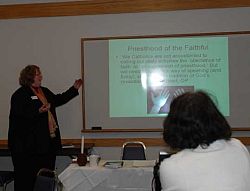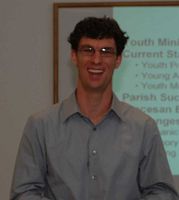Members learn of religious education in two languages

SALT LAKE CITY — With an icon of Christ the Teacher, Susan Northway, director of the Diocesan Office of Religious Education, began the Jan. 12 meeting of the Diocesan Pastoral Council at the Vaughan Center at St. Ambrose Catholic Church. One of three presenters, Northway spoke of the work of her office. She was followed by Matthew Boerke, director of the Office of Youth and Young Adult Ministry, and Maria-Cruz Gray, director of the Office of Hispanic Ministry. "Our first responsibility as Catholic educators is catechesis, and Jesus told us to ‘go out and make disciples of all people,’" Northway said... "The Church is missionary by nature, and that urgent call to ministry is permeated by joy as Jesus sends us out." Northway explained that her office includes: evangelization and catechesis; catechesis formation and certification; and the lay ecclesial ministry program. "In teaching religious education, catechesis, we are following in the footsteps of the apostles," she said. "As St. Paul said, ‘My teaching is not my own.’" "We preach as we teach," Northway said. "Catechesis is the ministry of the Word." She pointed out four aspects of catechesis, including: promoting the faith; promoting knowledge of the liturgy and the sacraments, which is building the Kingdom of God; preparing Christians to work, live, and minister in community; and preparing Christians to be present as Christians as they live in the larger society. Chatechetical training for religious educators includes from 36-40 hours of experience for certification, she said. "Our office also offers spiritual formation, a monthly newsletter, teaching through use of the electronic media and distance learning. We also use DVDs, E-mail, and other modern media techniques. "Our office also presents the annual Pastoral Congress that draws from 600 to 700 attendees, in addition to focus days, retreats and days of prayer." "Lay ecclesial ministry," she said, "is in-depth ministry formation. We are in our third year with our first group. Our theme is ‘Co-workers in the vineyard of the Lord. The four pillars of the Lay Ecclesial Ministry are: faith, vocation, building community, and responsibility. Lay ecclesial ministers are called to holiness, communion, and to witness as a priestly people." Northway said 30 people are currently involved in the Lay Ecclesial Ministry program, which is taught in collaboration with the University of Notre Dame, and they collaborate with the Diocesan Office of Youth and Young Adult Ministry and the Diocesan Office of Hispanic Ministry." Her office is always looking for new ways to develop systematic adult education as well as youth education. "We are constant trying to develop creative ways to assist teachers, Northway said. "We have begun to teach whole family catechesis that involves everyone." Matthew Boerke of the Diocesan Office of Youth and Young Adult Ministry, said it is a challenge to get and keep young adults involved in religious education and the activities that go with it. "One of our challenges is that we have so many young people who don’t live near our Catholic schools. We have to pay special attention to our youth out in the rural areas of the diocese." Boerke said the goals of his office include inviting youth and young adults to become involved in parish life; young adult ministry and diocesan events. "Our goal is to help our youth and young adults to fully encounter Christ and his Church," Boerke said. "Our young people have to be willing to change; to become empowered, and to live as disciples. Our call to discipleship includes drawing young people to responsible participation in the life, mission, and work of the faith community, to foster the total personal and spiritual growth of each young person, and to encourage them to live as Catholics in community life." Boerke showed an illustration of the aspects of life that lead youth and young people to God. They include: catechesis, advocacy, evangelization, justice and service, leadership as servant leaders, pastoral care, prayer and worship, and making and forming well-rounded Catholics. He developed lists of parishes who involve their youth and young adults well, those who involve them moderately well, and those who need to work harder at inviting youth and young ministers to participate. Boerke also spoke of PARA, Parish Athletic Recreation Association, and what they have to offer, the Girl and Boy Scouts, and Newman Centers, all of which encourage young people to become involved in faith activities. "The support of the parish and the pastor are the keys to our ministry," Boerke said. Parish and pastoral ministry is also vital to the work of the Office of Hispanic Ministry, which is experiencing growth as the Hispanic community in Utah increases, said Maria-Cruz Gray. In Utah, 72 percent of Hispanics consider themselves Catholic and it is our responsibility to meet their needs. I consider the Hispanic Catholics a bridge to the mainstream church. "We make use of the resources of the Diocesan Office of Religious Education and the Diocesan Office of Youth and Young Adult Ministry," she said. "I do the same work they do, but in a different language." "Hispanic/Latinos are present in practically every diocese in the United States," she said. "We are here to encourage them to become members of the Catholic community, not to proselytize them in any way." Cruz Gray said the Hispanic community is a young community, with many young people who have been born in this country. The number of Spanish Masses in the Diocese are increasing, and all seem to be full with open doors, said Father Ken Vialpondo, pastor of St. Joseph Parish, Ogden. In the Cathedral of the Madeleine, 1,400 Hispanic/Latino adults filled the church for the Epiphany celebration while 750 children were downstairs meeting the Three Kings, Cruz Gray said. "If you open the door to Hispanic people, they will come, but they must feel welcome... I am grateful for bilingual religious education."
© Copyright 2024 The Diocese of Salt Lake City. All rights reserved.


Stay Connected With Us